#nice theory! :)
Explore tagged Tumblr posts
Text
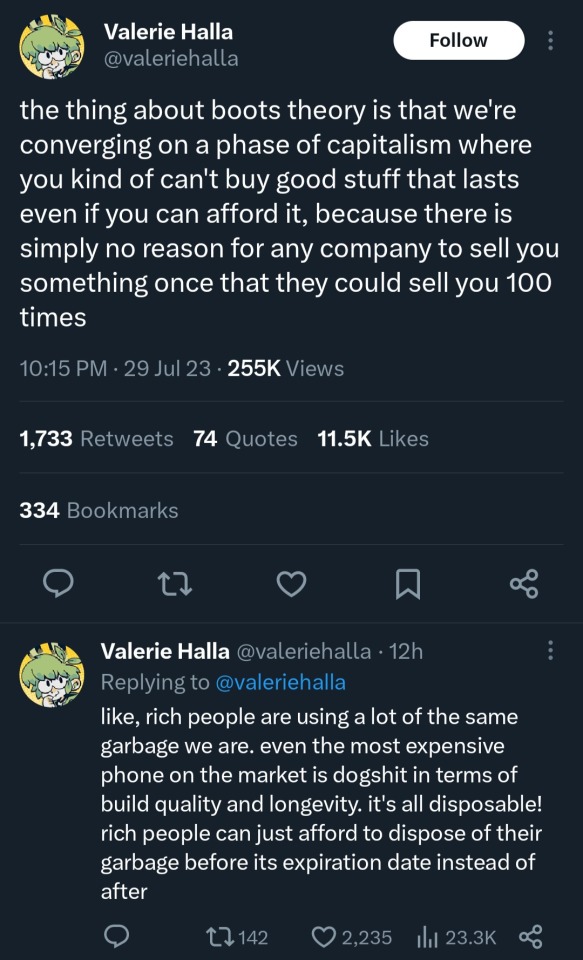
This makes me so sad and also I'm trying to remember if any of the Discworld books dealt with late stage capitalism
82K notes
·
View notes
Text

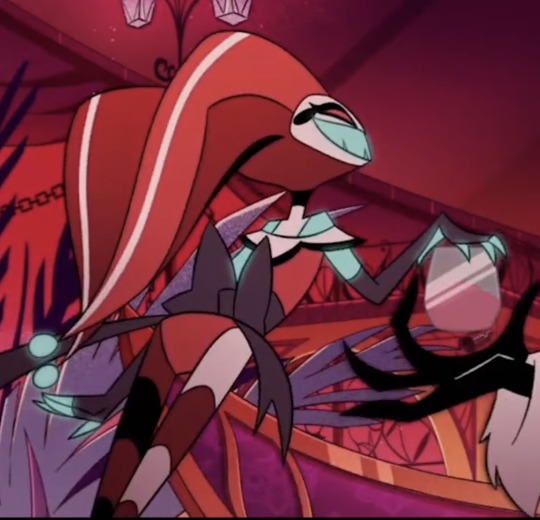


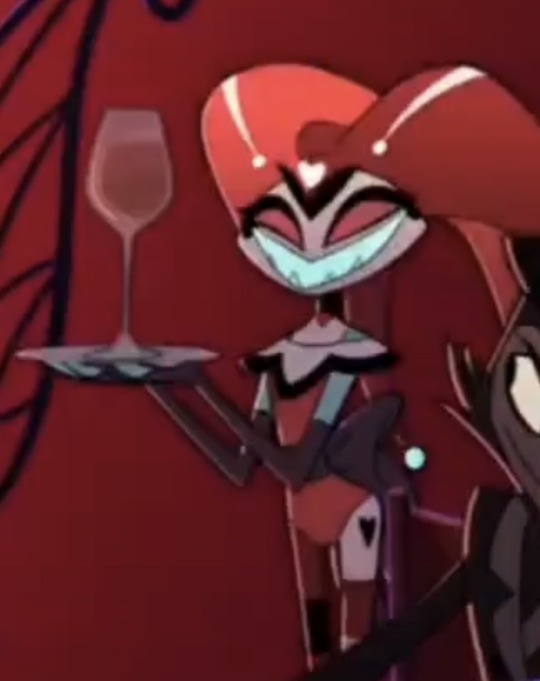

OF COURSE VALENTINO HAS A FIZZ BOT
#he ain’t beating the wanting#to be like ozzie theories#they have a nice design tho#my text#hazbin hotel#helluva boss#valentino#fizzarolli
16K notes
·
View notes
Text

Have you guys ever thought too hard about Crunchy Chip’s over-the-top avoidance of sweets? Because guess what?
I SURE did-
We all know that eating sweets in the Dark Cacao Kingdom isn’t as unforgivable as Chip makes it out to be. The citadel literally has some sweets stored that Fishgatto took in his benefit before.
Caramel Arrow’s fav drink is literally brown sugar milk tea (Like meeeee :D). Not even Dark Cacao himself is strict on it since he has given Chip a pass on the treats a number of times.
As far as I know, I believe no other Dark Cacao denizen is actually that strict on that rule? (I may be wrong idk)
So then, why is Chip like this?
…….
This is going into more theorising territory, but it’s been heavily implied that Chip has spent his entire life (if not ever since his childhood) in the wild. His voice lines point to this. He lives in the mountains, can set up camp by reflex, hunts with the pack, and overall just has a love for being outside.

Also, most likely raised by wolves even? I feel like his story below was meant to be about how he first met and was saved by Dark Cacao since it parallels the bit when Wildberry shares how he first met and is taken in by Hollyberry. While it’s not stated how old he was in that time, I’m going to assume somewhat young enough near Wild’s age if we’re seeing the two stories as parallels?
(After all, this sequence is meant to show why these two cookies are the best, most loyal options to be entrusted with their monarch’s soul jam. It makes sense to me that they’re parallels of a first-meet.
AGAIN, this is my interpretation only!! This story could really be taken as something else too.)

And I’ve been thinking. Assuming IF Chip has spent his childhood in the wild, he must’ve been isolated from cookie civilisation/cookie social circles for a period of time.
Until he was ‘saved’ and then taken in to train and become a warrior and Cream Wolf Captain. With his childhood spent not growing up in a typical cookie home and instead, his heart being always in tune with the wild more, there’s bound to be some dissociation with his fellow Dark Cacaoians.

(This is also the guy who doesn’t know what a delegation is despite being a man in his mid 30s tops. Adding more into my theory that he’s somewhat detached from society.)
………..
Getting to the point, what if this isolation is the explanation? Chip has mentioned that his job has him needed at the kingdom’s borders, thus making him even more distant from other cookies.

And even then, the others even agree so that his rightful place and the place he’s most expected to be in, is in the mountains.


Not saying that this is a bad thing. Not at all! He loves his job. I’m sure Chip loves being in the mountains with his wolves. He’s mentioned how he’s missed and is fully content being there a bunch.
It’s just that…. Does he ever feel a longing to belong? After all, it’s an ingrained thing to desire connections. Not just with the wolves but also, with his very own people too. Does not growing up among other children cookies just like his other fellow warriors had, ever get to his head sometimes?
Does it ever make him feel….isolated and distant in a sense?
Unless, this could be fixed of course. He could really, really, really commit to the values every warrior should have. And Discipline is one of them! If he’s dedicated to the bit, then he could convince himself that he truly does belong and IS a Dark Cacao warrior.
He’ll prove it if he must! To the king, to the others, to himself!

He feels the need to greatly appeal and prove to Dark Cacao so much that he does have a place in this kingdom after all. Why wouldn’t he? He’s kept strict to every rule and expectation, right??
If we consider that the theory he grew up isolated in the wild as a kid could be true, this means Chip has felt like an outsider ever since he could remember.
Being a Dark Cacaoian by blood/jam. But at the same time, still not fitting in. Its tough. (Not projecting nope.)
Btw, this may or may not reminded me of someone else….

Mr. “Would rather be in the silence of the Royal Gardens than loud-ass parties and talking and I’m fully aware how weird that sounds coming from a Hollyberrian cookie.”
*coughs coughs*
Totally not spreading my Wildchip propaganda but I just thought it’d be neat if they talk about how they love their respective kingdoms and would die to serve them but also-also, it lowkey feels weird and kinda hurts to not actually fit in with your own fellow cookies. Also WHAT, you’re an orphan adopted by your Ancient too???
………….
So anyways, I probs dug too deep into what should’ve been a comedic trivial thing of a character and made it into a mini sad-fest. Whups.
Though, it could also be simply that Chip’s just really dedicated while silly about it buuuuuuuut, that’s not as fun to analyse.
TLDR: “I didn’t have normal childhood like other cookies so I sometimes feel like not truly belonging but that’s not true because I DEFINITELY am a Dark Cacao Warrior and I can prove it by overcommitting to the bit.”
Btw, Happy late Bday Crunchy Chip <3 🎉💖
#little wolf gremlin will always be loved by me#kinda shy to share my thoughts#because they make sense to me but idk if they do to other people blegh#be nice pls#crk#crk analysis#crk headcanons#crk theory#cookie run kingdom#crunchy chip cookie#flicker’s rambles#long post#wildberry cookie#not really about him but he’s mentioned soooo
822 notes
·
View notes
Text
Retiring the US debt would retire the US dollar
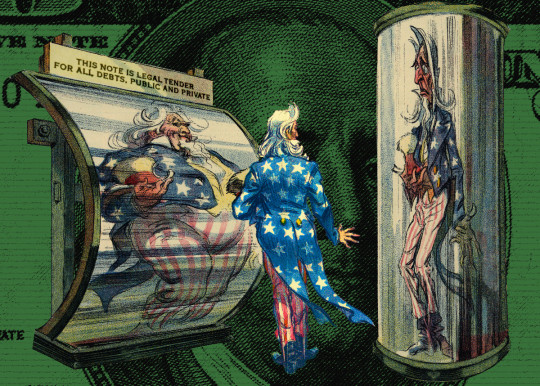
THIS WEDNESDAY (October 23) at 7PM, I'll be in DECATUR, GEORGIA, presenting my novel THE BEZZLE at EAGLE EYE BOOKS.

One of the most consequential series of investigative journalism of this decade was the Propublica series that Jesse Eisinger helmed, in which Eisinger and colleagues analyzed a trove of leaked IRS tax returns for the richest people in America:
https://www.propublica.org/series/the-secret-irs-files
The Secret IRS Files revealed the fact that many of America's oligarchs pay no tax at all. Some of them even get subsidies intended for poor families, like Jeff Bezos, whose tax affairs are so scammy that he was able to claim to be among the working poor and receive a federal Child Tax Credit, a $4,000 gift from the American public to one of the richest men who ever lived:
https://www.propublica.org/article/the-secret-irs-files-trove-of-never-before-seen-records-reveal-how-the-wealthiest-avoid-income-tax
As important as the numbers revealed by the Secret IRS Files were, I found the explanations even more interesting. The 99.9999% of us who never make contact with the secretive elite wealth management and tax cheating industry know, in the abstract, that there's something scammy going on in those esoteric cults of wealth accumulation, but we're pretty vague on the details. When I pondered the "tax loopholes" that the rich were exploiting, I pictured, you know, long lists of equations salted with Greek symbols, completely beyond my ken.
But when Propublica's series laid these secret tactics out, I learned that they were incredibly stupid ruses, tricks so thin that the only way they could possibly fool the IRS is if the IRS just didn't give a shit (and they truly didn't – after decades of cuts and attacks, the IRS was far more likely to audit a family earning less than $30k/year than a billionaire).
This has become a somewhat familiar experience. If you read the Panama Papers, the Paradise Papers, Luxleaks, Swissleaks, or any of the other spectacular leaks from the oligarch-industrial complex, you'll have seen the same thing: the rich employ the most tissue-thin ruses, and the tax authorities gobble them up. It's like the tax collectors don't want to fight with these ultrawealthy monsters whose net worth is larger than most nations, and merely require some excuse to allow them to cheat, anything they can scribble in the box explaining why they are worth billions and paying little, or nothing, or even entitled to free public money from programs intended to lift hungry children out of poverty.
It was this experience that fueled my interest in forensic accounting, which led to my bestselling techno-crime-thriller series starring the two-fisted, scambusting forensic accountant Martin Hench, who made his debut in 2022's Red Team Blues:
https://us.macmillan.com/books/9781250865847/red-team-blues
The double outrage of finding out how badly the powerful are ripping off the rest of us, and how stupid and transparent their accounting tricks are, is at the center of Chokepoint Capitalism, the book about how tech and entertainment companies steal from creative workers (and how to stop them) that Rebecca Giblin and I co-authored, which also came out in 2022:
https://chokepointcapitalism.com/
Now that I've written four novels and a nonfiction book about finance scams, I think I can safely call myself a oligarch ripoff hobbyist. I find this stuff endlessly fascinating, enraging, and, most importantly, energizing. So naturally, when PJ Vogt devoted two episodes of his excellent Search Engine podcast to the subject last week, I gobbled them up:
https://www.searchengine.show/listen/search-engine-1/why-is-it-so-hard-to-tax-billionaires-part-1
I love the way Vogt unpacks complex subjects. Maybe you've had the experience of following a commentator and admiring their knowledge of subjects you're unfamiliar with, only have them cover something you're an expert in and find them making a bunch of errors (this is basically the experience of using an LLM, which can give you authoritative seeming answers when the subject is one you're unfamiliar with, but which reveals itself to be a Bullshit Machine as soon as you ask it about something whose lore you know backwards and forwards).
Well, Vogt has covered many subjects that I am an expert in, and I had the opposite experience, finding that even when he covers my own specialist topics, I still learn something. I don't always agree with him, but always find those disagreements productive in that they make me clarify my own interests. (Full disclosure: I was one of Vogt's experts on his previous podcast, Reply All, talking about the inkjet printerization of everything:)
https://gimletmedia.com/shows/reply-all/brho54
Vogt's series on taxing billionaires was no exception. His interview subjects (including Eisinger) were very good, and he got into a lot of great detail on the leaker himself, Charles Littlejohn, who plead guilty and was sentenced to five years:
https://jacobin.com/2023/10/charles-littlejohn-irs-whistleblower-pro-publica-tax-evasion-prosecution
Vogt also delved into the history of the federal income tax, how it was sold to the American public, and a rather hilarious story of Republican Congressional gamesmanship that backfired spectacularly. I'd never encountered this stuff before and boy was it interesting.
But then Vogt got into the nature of taxation, and its relationship to the federal debt, another subject I've written about extensively, and that's where one of those productive disagreements emerged. Yesterday, I set out to write him a brief note unpacking this objection and ended up writing a giant essay (sorry, PJ!), and this morning I found myself still thinking about it. So I thought, why not clean up the email a little and publish it here?
As much as I enjoyed these episodes, I took serious exception to one – fairly important! – aspect of your analysis: the relationship of taxes to the national debt.
There's two ways of approaching this question, which I think of as akin to classical vs quantum physics. In the orthodox, classical telling, the government taxes us to pay for programs. This is crudely true at 10,000 feet and as a rule of thumb, it's fine in many cases. But on the ground – at the quantum level, in this analogy – the opposite is actually going on.
There is only one source of US dollars: the US Treasury (you can try and make your own dollars, but they'll put you in prison for a long-ass time if they catch you.).
If dollars can only originate with the US government, then it follows that:
a) The US government doesn't need our taxes to get US dollars (for the same reason Apple doesn't need us to redeem our iTunes cards to get more iTunes gift codes);
b) All the dollars in circulation start with spending by the US government (taxes can't be paid until dollars are first spent by their issuer, the US government); and
c) That spending must happen before anyone has been taxed, because the way dollars enter circulation is through spending.
You've probably heard people say, "Government spending isn't like household spending." That is obviously true: households are currency users while governments are currency issuers.
But the implications of this are very interesting.
First, the total dollars in circulation are:
a) All the dollars the government has ever spent into existence funding programs, transferring to the states, and paying its own employees, minus
b) All the dollars that the government has taxed away from us, and subsequently annihilated.
(Because governments spend money into existence and tax money out of existence.)
The net of dollars the government spends in a given year minus the dollars the government taxes out of existence that year is called "the national deficit." The total of all those national deficits is called "the national debt." All the dollars in circulation today are the result of this national debt. If the US government didn't have a debt, there would be no dollars in circulation.
The only way to eliminate the national debt is to tax every dollar in circulation out of existence. Because the national debt is "all the dollars the government has ever spent," minus "all the dollars the government has ever taxed." In accounting terms, "The US deficit is the public's credit."
When billionaires like Warren Buffet tell Jesse Eisinger that he doesn't pay tax because "he thinks his money is better spent on charitable works rather than contributing to an insignificant reduction of the deficit," he is, at best, technically wrong about why we tax, and at worst, he's telling a self-serving lie. The US government doesn't need to eliminate its debt. Doing so would be catastrophic. "Retiring the US debt" is the same thing as "retiring the US dollar."
So if the USG isn't taxing to retire its debts, why does it tax? Because when the USG – or any other currency issuer – creates a token, that token is, on its face, useless. If I offered to sell you some "Corycoins," you would quite rightly say that Corycoins have no value and thus you don't need any of them.
For a token to be liquid – for it to be redeemable for valuable things, like labor, goods and services – there needs to be something that someone desires that can be purchased with that token. Remember when Disney issued "Disney dollars" that you could only spend at Disney theme parks? They traded more or less at face value, even outside of Disney parks, because everyone knew someone who was planning a Disney vacation and could make use of those Disney tokens.
But if you go down to a local carny and play skeeball and win a fistful of tickets, you'll find it hard to trade those with anyone outside of the skeeball counter, especially once you leave the carny. There's two reasons for this:
1) The things you can get at the skeeball counter are pretty crappy so most people don't desire them; and ' 2) Most people aren't planning on visiting the carny, so there's no way for them to redeem the skeeball tickets even if they want the stuff behind the counter (this is also why it's hard to sell your Iranian rials if you bring them back to the US – there's not much you can buy in Iran, and even someone you wanted to buy something there, it's really hard for US citizens to get to Iran).
But when a sovereign currency issuer – one with the power of the law behind it – demands a tax denominated in its own currency, they create demand for that token. Everyone desires USD because almost everyone in the USA has to pay taxes in USD to the government every year, or they will go to prison. That fact is why there is such a liquid market for USD. Far more people want USD to pay their taxes than will ever want Disney dollars to spend on Dole Whips, and even if you are hoping to buy a Dole Whip in Fantasyland, that desire is far less important to you than your desire not to go to prison for dodging your taxes.
Even if you're not paying taxes, you know someone who is. The underlying liquidity of the USD is inextricably tied to taxation, and that's the first reason we tax. By issuing a token – the USD – and then laying on a tax that can only be paid in that token (you cannot pay federal income tax in anything except USD – not crypto, not euros, not rials – only USD), the US government creates demand for that token.
And because the US government is the only source of dollars, the US government can purchase anything that is within its sovereign territory. Anything denominated in US dollars is available to the US government: the labor of every US-residing person, the land and resources in US territory, and the goods produced within the US borders. The US doesn't need to tax us to buy these things (remember, it makes new money by typing numbers into a spreadsheet at the Federal Reserve). But it does tax us, and if the taxes it levies don't equal the spending it's making, it also sells us T-bills to make up the shortfall.
So the US government kinda acts like classical physics is true, that is, like it is a household and thus a currency user, and not a currency issuer. If it spends more than it taxes, it "borrows" (issues T-bills) to make up the difference. Why does it do this? To fight inflation.
The US government has no monetary constraints, it can make as many dollars as it cares to (by typing numbers into a spreadsheet). But the US government is fiscally constrained, because it can only buy things that are denominated in US dollars (this is why it's such a big deal that global oil is priced in USD – it means the US government can buy oil from anywhere, not only the USA, just by typing numbers into a spreadsheet).
The supply of dollars is infinite, but the supply of labor and goods denominated in US dollars is finite, and, what's more, the people inside the USA expect to use that labor and goods for their own needs. If the US government issues so many dollars that it can outbid every private construction company for the labor of electricians, bricklayers, crane drivers, etc, and puts them all to work building federal buildings, there will be no private construction.
Indeed, every time the US government bids against the private sector for anything – labor, resources, land, finished goods – the price of that thing goes up. That's one way to get inflation (and it's why inflation hawks are so horny for slashing government spending – to get government bidders out of the auction for goods, services and labor).
But while the supply of goods for sale in US dollars is finite, it's not fixed. If the US government takes away some of the private sector's productive capacity in order to build interstates, train skilled professionals, treat sick people so they can go to work (or at least not burden their working-age relations), etc, then the supply of goods and services denominated in USD goes up, and that makes more fiscal space, meaning the government and the private sector can both consume more of those goods and services and still not bid against one another, thus creating no inflationary pressure.
Thus, taxes create liquidity for US dollars, but they do something else that's really important: they reduce the spending power of the private sector. If the US only ever spent money into existence and never taxed it out of existence, that would create incredible inflation, because the supply of dollars would go up and up and up, while the supply of goods and services you could buy with dollars would grow much more slowly, because the US government wouldn't have the looming threat of taxes with which to coerce us into doing the work to build highways, care for the sick, or teach people how to be doctors, engineers, etc.
Taxes coercively reduce the purchasing power of the private sector (they're a stick). T-bills do the same thing, but voluntarily (they the carrot).
A T-bill is a bargain offered by the US government: "Voluntarily park your money instead of spending it. That will create fiscal space for us to buy things without bidding against you, because it removes your money from circulation temporarily. That means we, the US government, can buy more stuff and use it to increase the amount of goods and services you can buy with your money when the bond matures, while keeping the supply of dollars and the supply of dollar-denominated stuff in rough equilibrium."
So a bond isn't a debt – it's more like a savings account. When you move money from your checking to your savings, you reduce its liquidity, meaning the bank can treat it as a reserve without worrying quite so much about you spending it. In exchange, the bank gives you some interest, as a carrot.
I know, I know, this is a big-ass wall of text. Congrats if you made it this far! But here's the upshot. We should tax billionaires, because it will reduce their economic power and thus their political power.
But we absolutely don't need to tax billionaires to have nice things. For example: the US government could hire every single unemployed person without creating inflationary pressure on wages, because inflation only happens when the US government tries to buy something that the private sector is also trying to buy, bidding up the price. To be "unemployed" is to have labor that the private sector isn't trying to buy. They're synonyms. By definition, the feds could put every unemployed person to work (say, training one another to be teachers, construction workers, etc – and then going out and taking care of the sick, addressing the housing crisis, etc etc) without buying any labor that the private sector is also trying to buy.
What's even more true than this is that our taxes are not going to reduce the national debt. That guest you had who said, "Even if we tax billionaires, we will never pay off the national debt,"" was 100% right, because the national debt equals all the money in circulation.
Which is why that guest was also very, very wrong when she said, "We will have to tax normal people too in order to pay off the debt." We don't have to pay off the debt. We shouldn't pay off the debt. We can't pay off the debt. Paying off the debt is another way of saying "eliminating the dollar."
Taxation isn't a way for the government to pay for things. Taxation is a way to create demand for US dollars, to convince people to sell goods and services to the US government, and to constrain private sector spending, which creates fiscal space for the US government to buy goods and services without bidding up their prices.
And in a "classical physics" sense, all of the preceding is kinda a way of saying, "Taxes pay for government spending." As a rough approximation, you can think of taxes like this and generally not get into trouble.
But when you start to make policy – when you contemplate when, whether, and how much to tax billionaires – you leave behind the crude, high-level approximation and descend into the nitty-gritty world of things as they are, and you need to jettison the convenience of the easy-to-grasp approximation.
If you're interested in learning more about this, you can tune into this TED Talk by Stephanie Kelton, formerly formerly advisor to the Senate Budget Committee chair, now back teaching and researching econ at University of Missouri at Kansas City:
https://www.ted.com/talks/stephanie_kelton_the_big_myth_of_government_deficits?subtitle=en
Stephanie has written a great book about this, The Deficit Myth:
https://pluralistic.net/2020/05/14/everybody-poops/#deficit-myth
There's a really good feature length doc about it too, called "Finding the Money":
https://findingmoneyfilm.com/
If you'd like to read more of my own work on this, here's a column I wrote about the nature of currency in light of Web3, crypto, etc:
https://locusmag.com/2022/09/cory-doctorow-moneylike/

Tor Books as just published two new, free LITTLE BROTHER stories: VIGILANT, about creepy surveillance in distance education; and SPILL, about oil pipelines and indigenous landback.


If you'd like an essay-formatted version of this post to read or share, here's a link to it on pluralistic.net, my surveillance-free, ad-free, tracker-free blog:
https://pluralistic.net/2024/10/21/we-can-have-nice-things/#public-funds-not-taxpayer-dollars
#pluralistic#mmt#modern monetary theory#warren buffett#podcasts#pj vogt#billionaires#economics#we can have nice things#taxes#taxing billionaires#the irs files#irs files#jesse eisenger#propublica
1K notes
·
View notes
Text
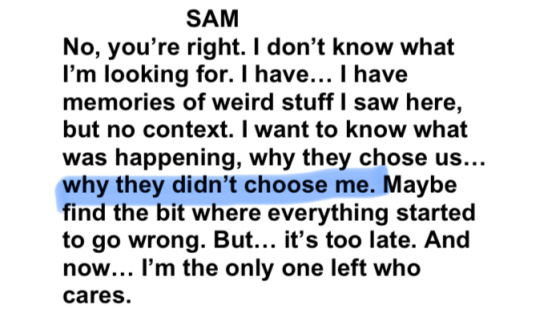
I’m calling it now, Sam’s gonna become an avatar, willingly.
#the magnus protocol#That’d be a nice parallel to Jon being the avatar without knowing#Like come on#samama khalid#tmagp#tmagp spoilers#tmagp theory
3K notes
·
View notes
Text

drew these many moons ago in a frenzy. figured i’d fix them up at some point. did not get round to that lol. maybe one day! in the mean time behold my beloved ghosts<3
#i don’t know why pats dead and the rest arent(?) (maybe mary is? i. actually cannot remember what i was going for)#but yeah they’re like. not finished at all ik i had plans for more background bits and stuff#also wanted to make all the colours go together a bit more nicely and the wallpaper be the actual wallpaper colour#i strive for coherence! and yet and have no understanding of colour theory#why all my Actual art is line work and nothing else lol#i did also want to redraw pat and julian but i was going round in circles w it so they’re staying like that for now#anyways why i do i feel the need to slag off stuff i make!! i do not know#genuinely had a great time drawing these many months ago#maybe i have a hyperfixation fueled an all nighter again and finish them who knows#but also if i do i would kinda like to do some yonderland characters lol#bbc ghosts#bbc ghosts fanart#six idiots#my fanart#my art
688 notes
·
View notes
Text
TBHX: What do the doves represent? Or any of it, really?
I was rewatching TBHX and omg I saw things I hadn't seen or considered before. There are just so many details that it's hard not to miss things.
The click came to me while I was watching the scene where Nice kills himself. Notice the white doves flying around and then X's image on the screen facing them right at the moment Nice jumps. It made me think: 'So does X really have power over the other heroes, or is he just observing them... or neither?'
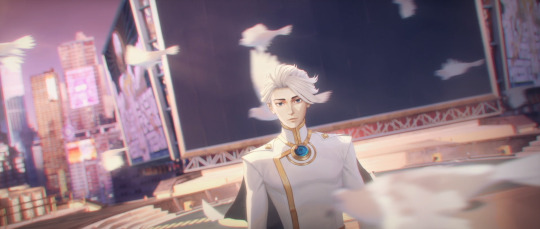
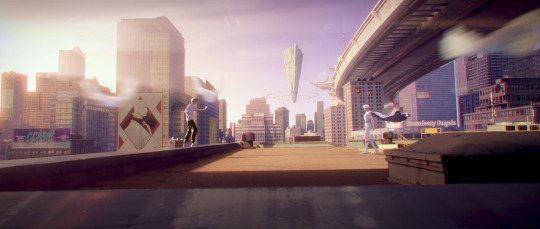
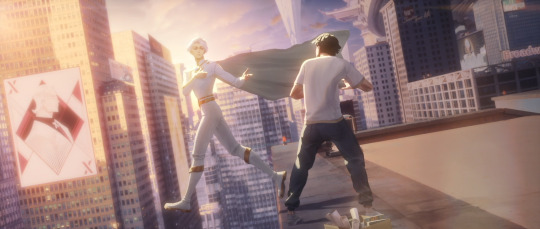
But then I remembered both the OP and ED being heavy on the dove metaphor.
Let's start with the OP:
First, we see X throwing each of the heroes' cards.
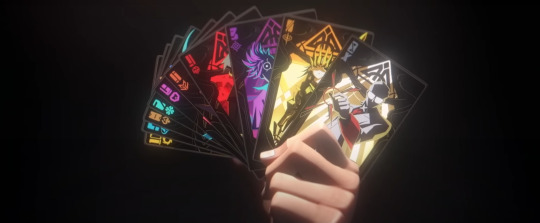
2. Then, they all turn into pigeons and fly toward him.
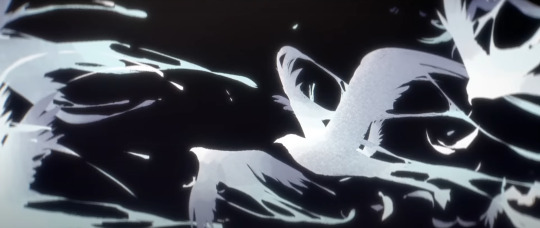
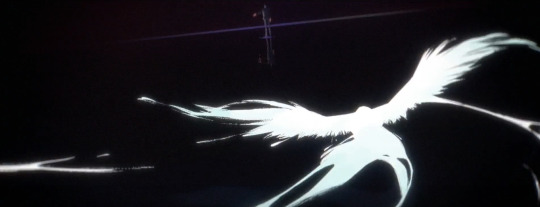
3. Finally, we see X in a breach, looking like he's above and below everything at the same time. Then red strings appear, with him at the center.
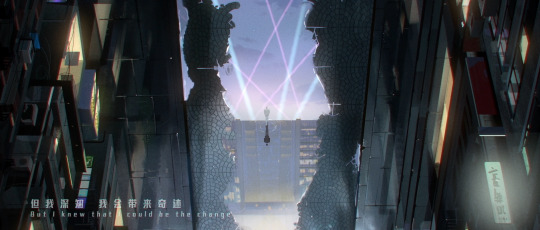

There are 9 red strings in the scene, with him in the middle, making 10. Of course, that's not a coincidence. It made me think: maybe the strings represent all the heroes' fates being intertwined and tied to X. The strings being red could symbolize not just the 'red string of fate,' but also blood ties—or maybe that they can only be broken by death.
There’s a lot more going on in the OP, but let’s go back to the doves.
They appear again, and even more, in the ED:
First, there’s a black-and-white scene with all the heroes sitting on the throne. The last one shown is X, who gets up and walks toward us—maybe tired of watching all this?

2. As X gets closer to the camera, a dove takes flight. More doves join it, flying above the city.




3. We see them looking at the heroes from above—9 doves total.



4. When X takes his hands out of his pockets, the doves seem startled, like a breach in the system happens. They take flight, X snaps his fingers, and they all start falling through (maybe the breach from the OP?), surrounded by feathers. The sequence switches to color.




Note that here we have an aspect ratio change, the colorful scenes are closer.
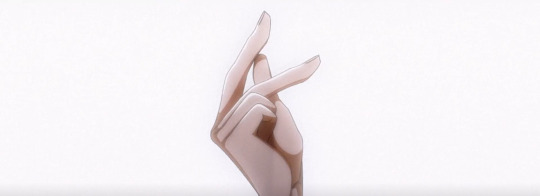
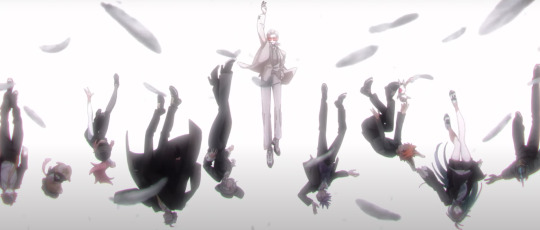
5. We see the same places as before, but now: no posters of Loli, her name is gone from the wall, the city looks empty, screens are off, no ads. An ocean of feathers keeps falling.

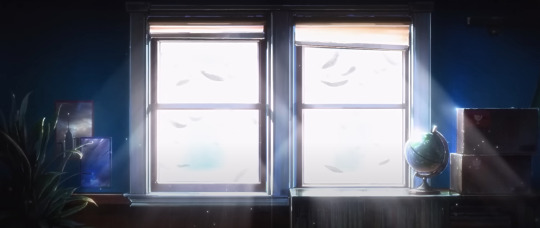
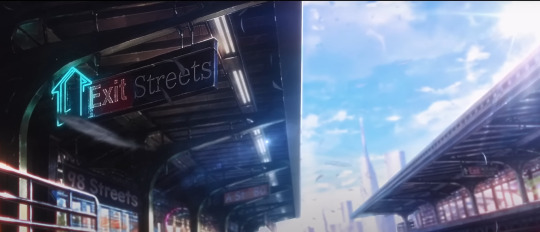
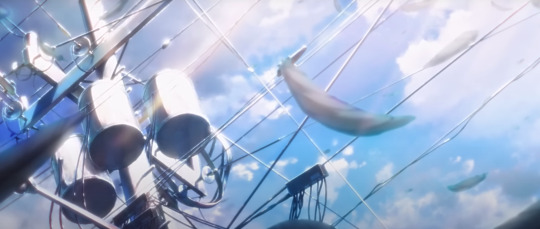
6. A feather lands on the palm of a hand that looks dead or unconscious. The trust count on the wrist starts twitching and eventually disappears. The hand moves and grabs the feather. So, did they regain consciousness after being freed from the trust's shackles?

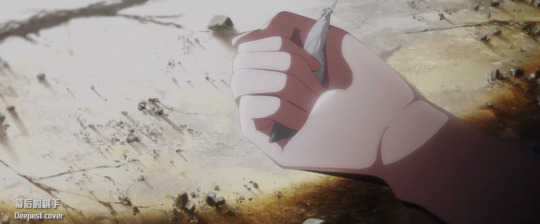
7. It ends with a feather landing on the empty throne—now in color—and the light goes out.
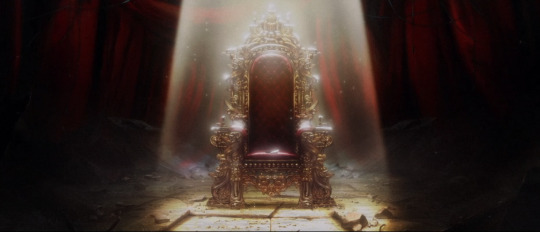

We can’t be sure what it all means just yet, but I think the OP, the episodes, and the ED are beautifully connected. Everything feels intentional. For example, in the ED, the aspect ratio changes when the transition from black and white to color happens. It's a clever cinematic device that makes us feel drawn into the new 'world' they've just entered.
I think the meaning of the doves changes throughout. Sometimes they represent those controlling everything, other times the heroes, and sometimes (through the feathers) maybe even every person in the world.
X could be so many things—maybe the first person to awaken as a hero, or the one chosen to lead... or maybe not even a real person at all, but an entity. Though we do see him working in an office and doing daily things. Is he observing them all the time? If so, why?
There are also lots of gambling references—cards, coins, roulette—which I think inspired the black-and-red color scheme in the logo. Is X the one gambling with reality? Or against it? Or against whoever’s really in control?
X’s ability, the breach, and the red strings make me think of a ton of scenarios: death as the only way back to reality... which would imply multiple realities. Maybe he can access parallel universes? The three main art styles might reflect three different timelines. And when X snaps his fingers, can he choose who goes where? If not, and if the feathers represent people, maybe everyone was teleported—along with the heroes. This metaphor makes perfect sense considering how the feathers fall and one reaches a hand, bringing it 'back to life.' Interpreting it as a phoenix metaphor, people are reawakened by the feather — which represents themselves — meaning they didn’t die, but were teleported and are now waking up in a new timeline. It’s as if the feather symbolizes their consciousness traveling through the breach that connects different timelines. The fact that the hand originally seemed to belong to an unresponsive body, combined with the colored scenes showing an empty city while feathers fall from the sky, could suggest that everyone is put 'to sleep' — their bodies remain, but their minds shift to a parallel reality. Or perhaps, the parallel reality isn’t a physical world at all, but their dreams while dormant. While writing this, I also started thinking it's kind of interesting that there are three distinct main art styles. If each one does represent a different 'universe,' then the name Treeman, aside from the logo being an actual tree, could be a wordplay—Three Man—with each version belonging to one of those universes. That leads to yet more questions: is their consciousness compartmentalized into three separate blocks, making it impossible for the person to realize they’re switching realities? or is it not split at all and that's why it appears to happen seamlessly? Some red strings in the OP intersect, others don’t. That might reflect which heroes influence each other—like E-Soul being a fan of Lucky Cyan, or X saving Ahu. But none of the strings connect to X directly; he stands alone in the center. Maybe that’s because all of them are tied to him whether they know it or not. It's also a nice way to show us that X could be the one pulling the strings, in a literal sense. The cards he throws in the OP remind me a lot of Tarot Cards, which could also imply handling with fate somehow.
There are also a lot of references to a stage. So maybe when the light goes out at the end of the ED, it means the play is over. They’re no longer heroes—they’re just ordinary people again.
Maybe everything was in their heads. Maybe they were never heroes—just ordinary people daydreaming about being more. The story videos only show a few characters in the 3D style. Maybe some don’t have a 3D version. If 3D represents reality, were they never real? Or maybe the 3D characters were never supposed to become heroes—but did anyway—starting a revolution that will break the system?
It could be that X’s power — or X himself — is a manifestation of people’s desire for change, to become something more, even to the point of altering reality entirely. You know that theory that says, 'for every choice we make, a new timeline is created'? X might be the means through which people can travel across these alternate realities they’ve shaped.
Thank you @steelenspots for opening my eyes to yet another meaning for the doves: "I'm also thinking about how X strongly has a magician aesthetic, and how doves tie into that — magicians 'free' doves in their performances. Nice gains freedom through death, and so far we've seen Lin Ling gain the freedom to be himself. We know X is the only one who can’t be controlled by the Commission, so maybe he’s observing and helping the heroes find their own freedom. If not freedom, then perhaps the doves symbolize peace in a more traditional sense — each character finding their own inner peace."
Well, it's al too crazy and I’ve got so much on my mind, I’m sure I forgot something here and there. But this is just me writing as I think, sharing my questions with y’all. I’ll post more when it comes to me. Edit: Part 2, but no longer about doves! It's really just me writing what comes to mind.
#to be hero x#tbhx#tbhx nice#tu bian yingxiong x#tbhx wreck#tbhx spoilers#凸变英雄x#tbhx ghostblade#tbhx x#tbhx lin ling#tbhx queen#tbhx the johnnies#tbhx the commoner#tbhx e soul#tbhx loli#tbhx dragon boy#tbhx lucky cyan#tbhx ahu#tbhx meta#subdeco theory
312 notes
·
View notes
Text
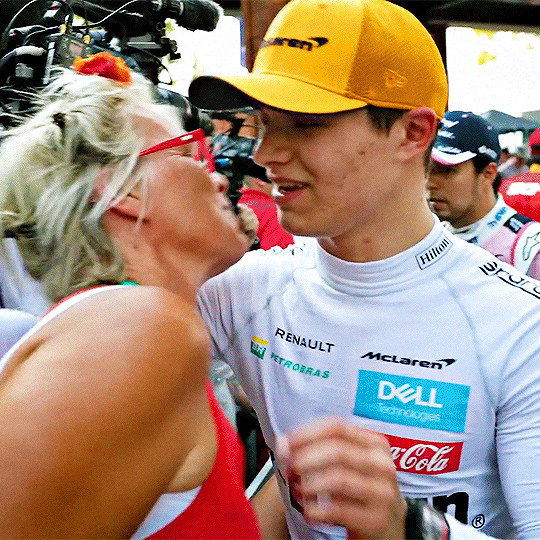






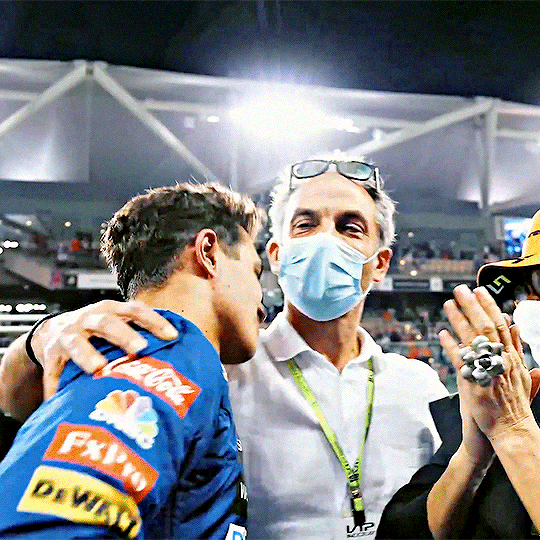
and when I hurt / hurtin' runs off my shoulder / how can I hurt when holding you 💕
#lando norris#critical lando theory#blessing the lando norris tag with something nice to chew on#lando is sooooo loved and taken care of and brought up with affection#it's one of the best things about him it reflects in everything he does#nadia's things
870 notes
·
View notes
Text
And what if Jinx escaped? Left behind a few things to move forward? What if she finally rode on "one of those things" and got out of Zaun and Piltover?
What if on her travels—to heal, to find a new purpose, become a girl who isn't damned, to be someone who isn't reminded of her past in everywhere and everyone she looks—she ends up in Demacia?
What if the story continues after magic has been reintroduced into Runeterra and we see it through the perspective of the kingdom so against its very existence? Introduced to the girl who resents the deal she's been dealt in life and fears—if not ashamed—of who she is: part magic.
What if these two opposing characters, for whatever reason or another, meet?
Lux, ever the optimist. Jinx, the guilty pessimist.
Lux, the girl who hides who she is in fear of being rejected and captured. Jinx, the girl who's been rejected and unwanted far too many times to count.
Lux, with a dream of adventure yet stationed in one place because of duty. Jinx, almost chronically bound to do what she wants or deems the better choice, despite what anyone wants, tells, or expects of her.
What if Jinx inspires a new way of seeing the world for Lux—one where she's not limited by others and can become a truer version of herself? What if Lux inspires a new way of seeing the world for Jinx—one where she can learn to love who she is, rather than view herself as a curse?
WHAT IF?
#arcane#jinx#jinx arcane#lux#lux crownguard#luxanna crownguard#arcane season 2#arcane spoilers#arcane theory#arcane zaun#piltover and zaun#zaun#arcane piltover#piltover#runeterra#demacia#what if#lightcannon#i just think it would be nice to see Jinx have a friend who sees the best in her#i think they'd also make a fun pair#amd just think about it!#also let Jinx find something good in life#she's been through enough
632 notes
·
View notes
Text





KNOCK OUT (2025) dir. Tee Bundit
#THIS WAS SO CUUUUUUUUTE#knock out the series#knock out#knockoutedit#tvedit#bledit#nice boripat#gunner natsakan#keenthun#asiandramanet#asianlgbtqdramas#thai drama#ali gif#userrlaura#usersasa#rinblr#mjtag#useractivated#clairedaring#usertorti#tuseralexa#uservix#listen in theory this is gross but in my silly gay drama? cute.
260 notes
·
View notes
Text

more Shifu
#shifu#kfp shifu#master shifu#tai lung#tai lung kung fu panda#tigress#kung fu panda#tigress kung fu panda#tigress kfp#kfp snow leopard#kung fu panda mei ling#not that i really like her just... man they just look nice together#i also find it amusing that at any given period of his life he has a close one who is a bigger predatory animal#who in theory could cause him a good deal of damage but in reality he's deadlier than most of them lol#the man was BORN to tame fire oh my god#while being a fluffy#tiny fluffy ball of charm. loveliness and exasperation#my art
972 notes
·
View notes
Text
guys maybe nice is alive

just nice + alt versions:



This is a bird theory post. I am not shutting up about bird theory. Clouds are the only background I am willing to draw. Episode 3 please do not disprove bird theory. I beg of you, Li Haoling
inspired by this post by @tea-cat-arts and this post by @grac3enocturne
#to be hero x#hero x#tbhx#nai si#tbhx nice#tu bian yingxiong x#奈斯#凸变英雄x#supremefloof#tbhx bird theory
247 notes
·
View notes
Text
btw what was the plan if jayce and viktor didn't disappear in the big gay galaxy butterfly explosion? what do you say after that?
like they climb back down the hexgates and jayce goes up to piltover's army and pulls out his poster board presentation called "TEN REASONS IT WAS JUST A MISTAKE AND THE HEXCORE TOLD HIM TO AND REALLY IT WASN'T THAT BAD AND IF VIKTOR GOES TO STILLWATER I GO TOO AND YOU'LL HAVE NOBODY TO REPAIR THE HEXGATES SO CONSIDER THIS WISELY"
#the 'jayvik teleported' theory is true but only because the arcane was their getaway driver#jayce was so gay and desperate in that moment i GUARANTEE he would take hostages to keep viktor safe#or just like. he'd ask mel very very nicely#jayvik#jayvik post canon#jayce talis#jayce arcane#arcane jayce#jayce x viktor#viktor x jayce#viktor arcane#arcane viktor
240 notes
·
View notes
Text
El was made to look like Will
Let’s build a case!!!
1. The Duffer Brothers confirmed it themselves
In Stranger Things: World Turned Upside Down (the official BTS companion book), Ross Duffer says:
“We wanted Eleven to feel out of place in the world, so we dressed her in clothes from Will’s closet, gave her his haircut, and made her look as much like him as possible.”
That is a direct quote. She was styled, intentionally, to evoke Will. Not just for narrative coincidence, not by accident but on purpose.
Why? Because…
2. It’s part of the show's emotional setup.
El appears in Chapter One; the day after Will goes missing.
Mike is devastated, disoriented, desperate to find his best friend.
And who shows up? A quiet, trembling kid in an oversized t-shirt, with short hair like Will’s haircut (it was planned to be a the same bowlcut but that was changed last minute), wearing his old clothes, who can’t speak, but clings to Mike like he’s her safety net.
This isn’t subtle. El’s entire visual and emotional presence was crafted to echo Will. The Duffers wanted Mike (and the audience) to feel that connection instantly. To blur the line between grief and attachment.
3. Her S1 Costuming Literally Uses Will’s Clothes.
I think everyone knows that the costuming team intentionally dresses El in Will’s style of clothing. The only time in S1 where this isn’t the case is when Mike makes her wear Nancy’s dress, trying to make her conform to the norm in order to keep her safe… weird. Also, in S1, Will and El’s colour palette are the same.
Even her body language mirrors Will’s: hands close to her chest, soft-spoken, wide-eyed.
These are not generic kid traits. They are Will’s traits.
4. Narratively, it mirrors Mike’s repression.
Mike falls for El not after she speaks or becomes "El," but when she comforts him. When she lets him feel safe. When she replaces Will’s absence.
He names her “El” the same way he used to name Will’s characters. It’s a continuation of the emotional bond he had with Will—but repackaged in a way he can express and others will accept.
5. And what happens when El stops looking like Will?
As El grows into her own identity (new haircut, her own clothes, her own voice) Mike’s confusion increases.
By Season 3 and especially 4, he’s struggling to express his feelings for her. He lies to her face. He says he loves her only when she’s begging for it. In a moment of desperation whilst surrounded by people who have a predisposition about his priorities and his role within the party as ‘Mike the brave.’
You can think about it as a PR stunt.
Compare that to how he talks to Will: unguarded. Emotional. Honest, even when he’s flailing.
6. Visual language backs this up.
- El’s intro is coded as a stand-in: standing in the rain, alone, scared—just like Will’s disappearance scene.
- The lighting, framing, and even score in scenes with Mike and El early on are eerily similar to shots of Mike and Will in flashbacks.
- Season 4 leans even harder: Mike stares at Will, not El, in emotionally intense scenes. El and Mike feel visually distanced—while Will and Mike are often framed together in softness, light, and eye contact.
WHAT DOES THIS ALL MEAN???:
The Duffers explicitly designed El to look like Will.
Mike formed his bond with El because she reminded him of Will.
That visual and emotional substitution becomes unstable when El starts being her own person.
Thus, Mike is left to confront the false perception he’s had of her (and Will by proxy)
The disguise is gone. Now he has to figure out who he was really seeing.
#there’s also El being called a boy in S1#she’s literally mistaken to be Will#i was supposed to post this earlier#but i forgor#this is all crazy if you ask me#guys pls treat this post nicely like u did my last one abt this#i trieddd#byler#stranger things#mike wheeler#will byers#byler endgame#byler nation#eleven stranger things#el hopper#stranger things theory#stranger things analysis
332 notes
·
View notes
Text
that episode 2 adds the implication that nice committed suicide out of treeman forcing him into a straight showmance, on top of all the other pressures, adds an undeniably tragic twist. to dig a little deeper, though, I can’t help but think of a few things:
1) that we have heard absolutely nothing from nice’s family (or wreck’s, for that matter).
2) that nice & wreck wanted to be heroes together — and the company forced them into this position.
from these, i do draw the conclusion that Nice wasn’t closeted in his personal life. The lack of a family contacting Nice after weeks of silence; there’s a distance, if they’re alive, that I think many gay people can relate to.
I draw the follow up implication, then, that Nice wasn’t just forced to remain closeted; he was forced back in.
the love he had hoped to maintain even through it was being devalued by the company as they began working to push Nice into the top ten. He had a “true love” show scheduled with a woman who loathed him — and had just seen a promo (sent by Lin Ling) indicating that the company planned for him to begin pushing for the top spot. In short, the closet doors were not just closed, but locking shut, with no room for Nice behind them and no path of escape.
If Treeman wanted take Nice’s life from him, then he would take Nice from them.
#my theory for why nice killed himself & why he pointed to lin ling. why he pushed back so much on promos (revisions revisions revisions)#theres a reason he fell from the marketing companys roof#to be hero x spoilers#tbhx#to be hero x#tbh x meta#we’ll see how much of this holds up by the end of the arc lol#lin ling was directly involved in creating nice’s image — the one that crushed him into a product. now lin ling has to see the human cost
247 notes
·
View notes